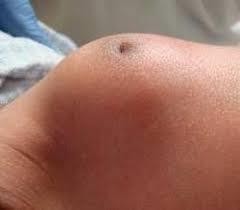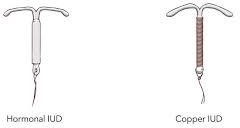A home health nurse is caring for a client who has unilateral mastitis and is experiencing discomfort in the affected breast. Which of the following Instructions should the nurse include?
Tell the client to apply hydrocortisone ointment to the affected area of the breast.
Recommend the client avoid wearing a nursing bra until symptoms resolve.
Suggest the client apply warm compresses to the affected breast.
Encourage the client to limit oral fluid intake to decrease milk production.
The Correct Answer is C
A) Incorrect- Hydrocortisone ointment is not typically recommended for treating mastitis, as it might not address the underlying infection.
B) Incorrect- Wearing a well-fitting, supportive nursing bra can actually help alleviate discomfort and is not typically contraindicated in cases of mastitis.
C) Correct - Applying warm compresses to the affected breast can help reduce pain and discomfort associated with mastitis. Warmth can improve blood flow and promote milk flow.
D) Incorrect- Encouraging the client to limit oral fluid intake to decrease milk production is not a recommended approach, as maintaining proper hydration is important, especially when dealing with infection.

Nursing Test Bank
Naxlex Comprehensive Predictor Exams
Related Questions
Correct Answer is A
Explanation
A) Correct- Intrauterine devices (IUDs) have one of the lowest failure rates among contraceptive methods. They are highly effective at preventing pregnancy.
B) Incorrect- Diaphragms have a higher failure rate compared to IUDs.
C) Incorrect- Oral contraceptives have a failure rate slightly higher than IUDs due to the potential for missed doses.
D) Incorrect- Contraceptive sponges have a higher failure rate compared to IUDs.

Correct Answer is C
Explanation
A) Incorrect- Checking urine for ketones is not necessary if the newborn's blood glucose level is low but stable and the baby is asymptomatic.
B) Incorrect- Administering glucagon is not indicated for an asymptomatic newborn with a low but stable blood glucose level.
C) Correct - Encouraging additional feeding is appropriate for an asymptomatic newborn with a low blood glucose level. Regular feeding can help increase blood glucose levels.
D) Incorrect- Waiting 4 hours to recheck blood glucose might not be appropriate if the baby's blood glucose is currently low. Addressing the low blood glucose level is more immediate.
Whether you are a student looking to ace your exams or a practicing nurse seeking to enhance your expertise , our nursing education contents will empower you with the confidence and competence to make a difference in the lives of patients and become a respected leader in the healthcare field.
Visit Naxlex, invest in your future and unlock endless possibilities with our unparalleled nursing education contents today
Report Wrong Answer on the Current Question
Do you disagree with the answer? If yes, what is your expected answer? Explain.
Kindly be descriptive with the issue you are facing.
